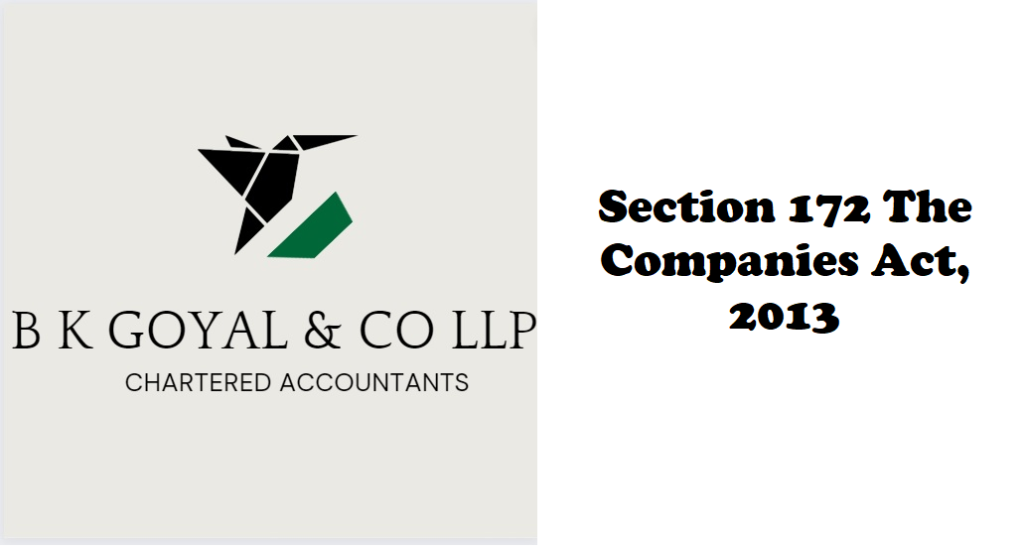Penalty
If a company is in default in complying with any of the provisions of this Chapter and for which no specific penalty or punishment is provided therein, the company and every officer of the company who is in default shall be liable to a penalty of fifty thousand rupees, and in case of continuing failure, with a further penalty of five hundred rupees for each day during which such failure continues, subject to a maximum of three lakh rupees in case of a company and one lakh rupees in case of an officer who is in default.”]
Amendment-
1. Substituted by the Companies (Amendment) Act, 2020. Notification dated 28th September, 2020 Amendment Effective from 21st December 2020
For section 172:-
Punishment
Notified Date of Section:01/04/2014
172. Punishment.— If a company contravenes any of the provisions of this Chapter and for which no specific punishment is provided therein, the company and every officer of the company who is in default shall be punishable with fine which shall not be less than fifty thousand rupees but which may extend to five lakh rupees.
The following section shall be substituted, namely:-
“Penalty
172. If a company is in default in complying with any of the provisions of this Chapter and for which no specific penalty or punishment is provided therein, the company and every officer of the company who is in default shall be liable to a penalty of fifty thousand rupees, and in case of continuing failure, with a further penalty of five hundred rupees for each day during which such failure continues, subject to a maximum of three lakh rupees in case of a company and one lakh rupees in case of an officer who is in default.”
Ensuring Compliance in Indian Companies: A Comprehensive Guide to Section 172 of the Companies Act, 2013
Navigating Compliance and Penalties with Clarity
The Companies Act, 2013, as amended in 2020, upholds corporate accountability through Section 172. This section outlines penalties for companies and their officers who fail to comply with certain provisions of the Act, even if those provisions don’t specify explicit penalties. Understanding these provisions is crucial for companies operating in India to maintain compliance and avoid financial repercussions.
Key Provisions of Section 172:
Understanding “Default”:
- A company is considered in “default” when it fails to adhere to a provision of the Act for which no specific penalty is mentioned elsewhere in the Act.
- Both the company and its officers in default face penalties for such non-compliance.
Penalties Imposed:
- Initial Penalty: A flat penalty of ₹50,000 is levied on the company and its defaulting officers.
- Continuing Failure: If non-compliance persists, an additional penalty of ₹500 per day is imposed, subject to a maximum of ₹3 lakhs for the company and ₹1 lakh for each officer in default.
Illustrative Examples:
Example 1:
- A company fails to hold its annual general meeting within the prescribed timeframe, violating Section 96 of the Act.
- While Section 96 doesn’t specify a penalty, Section 172 applies, subjecting the company and its defaulting officers to the aforementioned penalties.
Example 2:
- A company’s directors fail to disclose their interests in accordance with Section 184.
- Section 172’s penalties would apply here as well, as Section 184 doesn’t outline specific penalties.
Key Considerations:
- Amendment in 2020: The 2020 amendment replaced the term “punishment” with “penalty” and introduced the concept of continuing failure with daily penalties.
- Wide Scope: Section 172 encompasses a broad range of corporate compliance obligations.
- Due Diligence: Companies must exercise vigilance to ensure adherence to all applicable provisions of the Act.
Importance of Compliance:
- Financial Implications: Non-compliance can lead to significant financial penalties, potentially impacting a company’s financial health.
- Reputational Damage: Regulatory violations can tarnish a company’s reputation and erode stakeholder trust.
- Legal Consequences: In severe cases, non-compliance may escalate to legal proceedings and further sanctions.
Disclaimer: This information is intended to provide general guidance and should not be considered as a substitute for professional legal advice. Please consult a qualified legal professional for specific guidance relevant to your company’s circumstances.
Practice area's of B K Goyal & Co LLP
Income Tax Return Filing | Income Tax Appeal | Income Tax Notice | GST Registration | GST Return Filing | FSSAI Registration | Company Registration | Company Audit | Company Annual Compliance | Income Tax Audit | Nidhi Company Registration| LLP Registration | Accounting in India | NGO Registration | NGO Audit | ESG | BRSR | Private Security Agency | Udyam Registration | Trademark Registration | Copyright Registration | Patent Registration | Import Export Code | Forensic Accounting and Fraud Detection | Section 8 Company | Foreign Company | 80G and 12A Certificate | FCRA Registration |DGGI Cases | Scrutiny Cases | Income Escapement Cases | Search & Seizure | CIT Appeal | ITAT Appeal | Auditors | Internal Audit | Financial Audit | Process Audit | IEC Code | CA Certification | Income Tax Penalty Notice u/s 271(1)(c) | Income Tax Notice u/s 142(1) | Income Tax Notice u/s 144 |Income Tax Notice u/s 148 | Income Tax Demand Notice
Company Registration Services in major cities of India
Company Registration in Jaipur | Company Registration in Delhi | Company Registration in Pune | Company Registration in Hyderabad | Company Registration in Bangalore | Company Registration in Chennai | Company Registration in Kolkata | Company Registration in Mumbai | Company Registration in India | Company Registration in Gurgaon

